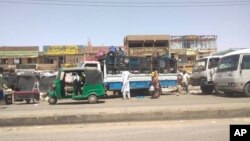"We think we've given them every shot. We've given them this venue to try and come together and try and find a way forward that doesn't involve achieving an outcome that's based on violence or military dominance," the U.S. official said.
"They are clearly not taking advantage of the format that we've given them. It's not succeeding in the way they had originally agreed in terms of this step by step process to reach a permanent cessation of hostilities."
The United States is consulting with Saudi Arabia and others in the Arab world and Africa about a path forward, and hoped to announce a recommended approach in the next few days, the official, who spoke on condition of anonymity, told reporters in Washington.
The talks in the Saudi Red Sea city of Jeddah have failed to permanently end fighting and clashes intensified as soon as a cease-fire ended on Sunday.
The Sudan army refused to extend that 24-hour cease-fire, the U.S. official said.
A second senior State Department official told reporters there was a "dawning realization" among the warring parties that there was no acceptable military solution. This had not yet translated, however, into willingness to take tangible steps to lock in a longer cease-fire and a broader permanent cessation of hostilities, the official said.
The second official said the United States is questioning how much more mileage they can get out of talks in Jeddah that could lead to a broader cessation of hostilities, or whether they would scale back talks and focus intently on humanitarian assistance.
"That's something we're actively talking about with partners," the official said.
The same official said the warring parties had not received much external support yet, despite concerns that the conflict would attract the interference of foreign actors, adding that work was being done to keep it that way.
"I think their previous partners are somewhat shocked. Everyone is shocked - like no one can believe that one would behave in such a suicidal manner. And they're concerned about the impact on their country and their region," the first official said.
Previous cease-fires had allowed some humanitarian access to the country, but aid agencies reported still being impeded by the fighting, bureaucracy and looting.






Forum